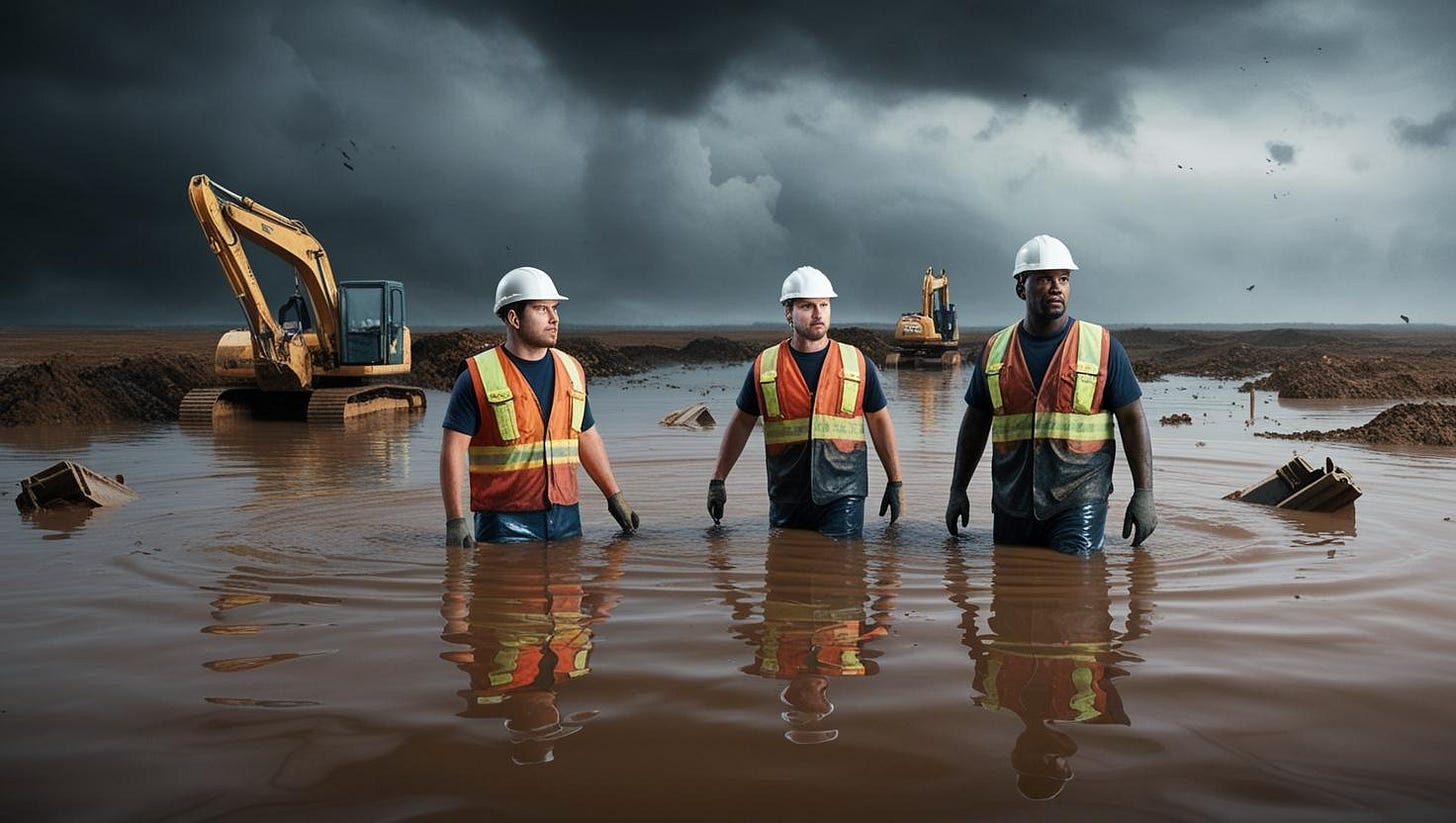Drowning in Intransigence
When faced with an existential threat, the default reaction of human beings throughout history has been to unite and pull together. During the COVID-19 pandemic, the nation rallied almost as one. Sure, there were outliers who shunned the vaccination, were ambushed by cake, or who held parties that were not parties at Number 10 Downing Street. Nonetheless, we came together to fight an invisible foe.
We came together during the Second World War too. While men of fighting age were off facing down the enemy, those who stayed at home were a part of the fight. From the land girls keeping up food production, to the factory workers making arms, to those serving in the Home Guard, all were fighting for the common good.
The National Federation of Demolition Contractors’ very foundation is built upon an apocryphal tale in which Winston Churchill himself called upon London's demolition contractors to unite as one, to make safe the buildings damaged during the Blitz.
As I said at the outset: existential threat? we all pull together. At least that’s how things have traditionally worked.
Today, we find ourselves facing perhaps the greatest threat the world has ever seen: climate change. Once again, there are outliers who point to a cold summer day as evidence that climate change is, you know, hot air. But most right-minded people - those who believe the Earth is round, that Elvis is dead, and that we are not all controlled by Bill Gates and his 5G masts - believe that global warming is bad. Very bad. That it is getting worse. That we need to do something about it.
Here’s where our reaction has differed. Rather than uniting to fight this common enemy, we all seem to be huddled in little silos; each of us doing a little bit, but none of us actually making any notable impact. Nowhere is this more evident than in the field of demolition and construction.
There is a silo of people who believe that demolition should be outlawed and that refit and refurbishment will save us all. There’s another silo that believes the demolition industry’s ability to reclaim secondary materials makes it an environmental warrior in its own right. Some think we should abandon diesel and petrol equipment and vehicles. Others point to the environmental and financial cost of switching to unwieldy electric and unproven hydrogen power.
As an industry, we are all facing the same global threat. But we are each heading off in different and often opposing directions. The result is that climate change remains, while real solutions remain just out of our reach.
The irony here is that this goes against just about everything the demolition and construction industry stands for. Ours is a sector that stands or falls upon its ability to collaborate. From joint venture organisations forged to deliver massive infrastructure projects, to dozens of specialist contractors pooling their resources to deliver a building, a bridge, or a road. Yet, when it comes to fighting climate change, it is every man for himself.
Sadly and predictably, I fear the main reason for this is money. Clients and main contractors will not consider adopting a new approach or methodology if it is likely to cost more time and more money. Companies are unwilling to invest in electric machines because they require charging time; and while a machine is on charge, it’s not earning. They are focused on the now and on their share price today, not tomorrow. They will likely remain so even when that water is lapping round the door of their palatial head office.
Yet it could all be so very different. If individual companies, individual disciplines, and individual industry sectors could - for just a moment - set aside their burning desire for competitive advantage, we are smart enough to see off this existential threat.
Amidst the dog-eat-dog world of demolition and construction, there reside some incredibly smart and incredibly practical people. People who are smart enough to steer us away from the environmental precipice; people who are smart enough to devise systems and solutions that walk the tightrope between a blanket ban on demolition and the desire to preserve embodied carbon. But those people, smart as they are, cannot fight the foe alone. Nor can they fight it on numerous, conflicting fronts.
This is the time for hands across the water. For unity. For coming together for a common cause. The threat posed by climate change is every bit as bad as that posed by the Luftwaffe, by AIDS, and by COVID-19. Each of those was defeated - partially or completely - through unity and collaboration. We desperately need that unity again.
The path forward doesn’t require grandiose declarations or unattainable ideals. It requires practical steps, open communication, and a willingness to collaborate beyond traditional boundaries. Small, concerted efforts made collectively can lead to significant change. We need to tap into the ingenuity and resilience that have defined our industry and use it to carve out a sustainable future. Individually, we are lost. But together, we can find a way.
This topic was the subject of an in-depth discussion on today's after show chat. You can listen to the resulting podcast here.





